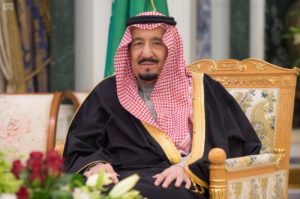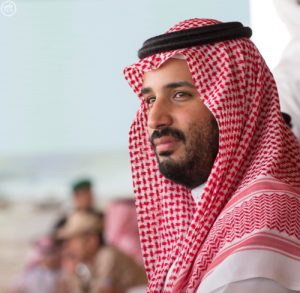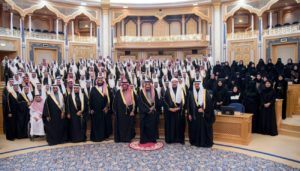The Kingdom of Saudi Arabia is at the heart of the Islamic world. It is an Arab and Islamic state governed by Sharia or Islamic law, the doctrine laid out in the Holy Qur’an and the Sunnah.
Saudi Arabia is a sovereign state, governed by an appointed King and Crown Prince as well as an appointed Council of Ministers also called the Cabinet. The government is advised by the 150 members of Majlis Al Shura Council.
The Custodian of the Two Holy Mosques, King Salman bin Abdulaziz Al Saud also holds the position of Prime Minister. He works closely with his ministers and advisors to ensure the welfare, dignity, protection, security and equal treatment of all citizens, and the progress of their nation.
At the heart of Saudi Arabia is Makkah, the centre to which all Muslims turn in prayer every day. King Salman as Custodian of the Two Holy Mosques sees the care for the two Holy Sites of Makkah and Madinah and for all pilgrims to the sites as his prime responsibility.

The Custodian of the Two Holy Mosques
King Salman bin Abdulaziz Al Saud
King Salman took over as Custodian of the Two Holy Mosques on 23 January, 2015, following the death of King Abdullah.

King Salman was born in Riyadh on 31 December, 1935. He received his education at the Prince’s School in Riyadh.
He served as Deputy Governor of Riyadh from March 1954 to April 1955, and Governor of Riyadh from April 1955 to December 1960 and again from February 1963 to 5 November, 2011, when he was appointed Minister of Defence. In 2012 he was appointed Crown Prince.
King Salman is well known for his charitable works. He is President of the Assembly of the Prince Salman Centre for Disability Research; Honorary President of the Assembly of Prince Fahd bin Salman for Patients with Kidney Failure; Honorary President of the Saudi Centre for Organ Transplantation as well as of many other associations.
Since 1956, King Salman has been heavily involved in a range of humanitarian efforts, taking responsibility for relief and aid being distributed to stricken regions around the world. King Salman has been presented with number of medals and awards for his humanitarian work from Bahrain, Bosnia and Herzegovina, France, Morocco, Palestine, Philippine, Senegal, the United Nations and Yemen.
In 2015 he set up the King Salman Aid and Relief Centre dedicated to providing humanitarian aid around the world to communities in crisis as a result of war and natural disasters.
He is also the recipient of several honorary degrees and academic awards. These include an honorary doctorate from the Islamic University of Madinah, the Prince Salman academic award, and the Kant Medal by the Berlin-Brandenburg Academy of Sciences and Humanities in appreciation of his contributions to the field of science.
Crown Prince Mohammad bin Salman Al Saud 

His Royal Highness Prince Mohammad bin Salman bin Abulaziz Al Saud was appointed Crown Prince and First Deputy Prime Minister by the Custodian of the Two Holy Mosques, King Salman on 21 June, 2017. He also retains the position of Minister of Defence. Prince Mohammed is the former Deputy Crown Prince, a position he has since 2015.
Prince Mohammed was born in 1985 to King Salman and Princess Fahda bint Falah bin Sultan bin Hathleen. The Prince graduated from the King Saud University with a bachelor degree in law, and subsequently spent several years working in the private sector. In 2009 Prince Mohammed became an advisor to King Salman when the King was Governor of Riyadh.
The Prince has held a number of advisory and ministerial roles in the Saudi Government in the past few years and was appointed Minister of Defence and Secretary General of the Royal Court in 2015.
Prince Mohammed has led the development of Vision 2030, the government’s plan for the dynamic future of the Kingdom. Vision 2030 aims to reduce Saudi Arabia’s dependence on oil, as well as diversifying and modernising the Kingdom’s economy, public sector, education and healthcare systems, and infrastructure.
The Council of Ministers or Cabinet
The Council of Ministers includes 23 ministers and 7 ministers of state, two of them with a portfolio.
Custodian of the Two Holy Mosques and Prime Minister
King Salman bin Abdulaziz Al-Saud
Crown Prince, Deputy Prime Minister and Minister of Defence
HRH Prince Mohammed bin Salman bin Abdulaziz Al-Saud
Minister of the National Guard
HRH Prince Abdullah bin Bander bin Abdulaziz Al-Saud
Minister of Interior:
HRH Prince Abdulaziz bin Saud bin Naif bin Abdulaziz Al-Saud
Minister of Culture:
HRH Badr bin Abdullah bin Mohammed bin Farhan Al-Saud
Minister for the Presidency of State Security
HE General Abdul Aziz bin Mohammed Al-Howairini
Minister of Education:
HE Dr. Hamad bin Mohammed Al-AsShaikh
Minister of Municipal and Rural Affairs:
HE Dr. Majed bin Abdullah Al-Qasabi
Minister of Foreign Affairs:
HE Ibrahim bin Abdulaziz Al-Assaf
Minister of Environment, Water and Agriculture:
HE Abdulrahman bin Abdulmohsen Al-Fadhli
Minister of Civil Service:
HE Sulaiman bin Abdullah Al-Hamdan
Minister of Finance:
HE Mohammed bin Abdullah Al-Jadaan
Minister of Health:
HE Dr. Tawfiq Al-Rabiah
Minister of Commerce and Investment:
HE Dr. Majed bin Abdullah Al-Qasabi
Minister of Media:
HE Turki bin Abdullah Al-Shabanah
Minister of Islamic Affairs, Dawah and Guidance:
HE Sheikh Abdullatif bin Abdulaziz Al-AsShaikh
Minister of Justice:
HE Dr. Walid bin Mohammad bin Saleh Al-Samaani
Minister of Labor and Social Development:
HE Ahmed bin Sulaiman Al-Rajhi
Minister of Energy, Industry and Mineral Resources:
HE Khaled bin Abdulaziz Al-Falih
Minister of Hajj and Umrah:
HE Muhammad Bantan
Minister of Economy and Planning:
HE Mohammed Al-Tuwaijri
Minister of Communications and Information Technology:
HE Abdullah bin Amer Al-Sawaha
Minister of Transport:
HE Nabeel bin Mohammed Al-Amudi
Minister of Housing:
HE Majed bin Abdullah bin Hamad Al-Hogail
The Consultative Council: The Majlis al-Shura 
 The Majlis al-Shura, or Consultative Council, is a legislative body that works closely with the King and his ministers to advise on the most pressing and important issues in Saudi Arabia. The council consists of 150 members, men and women from all walks of life, who are appointed by the King for a four-year term. These members are then assigned to one of 12 committees that deal with a range of state interests. The twelve committees are:
The Majlis al-Shura, or Consultative Council, is a legislative body that works closely with the King and his ministers to advise on the most pressing and important issues in Saudi Arabia. The council consists of 150 members, men and women from all walks of life, who are appointed by the King for a four-year term. These members are then assigned to one of 12 committees that deal with a range of state interests. The twelve committees are:
- Human Rights
- Education
- Culture
- Information
- Health and Social Affairs
- Services and Public Utilities
- Foreign Affairs
- Security
- Administration
- Islamic Affairs
- Economy and Industry
- Finance
In 2003, the Majis al-Shura was brought in as a full member of the Inter-Parliamentary Union. Their mandate was expanded in 2004 to include the power to propose new legislation and amend existing laws without the prior approval of the King.
